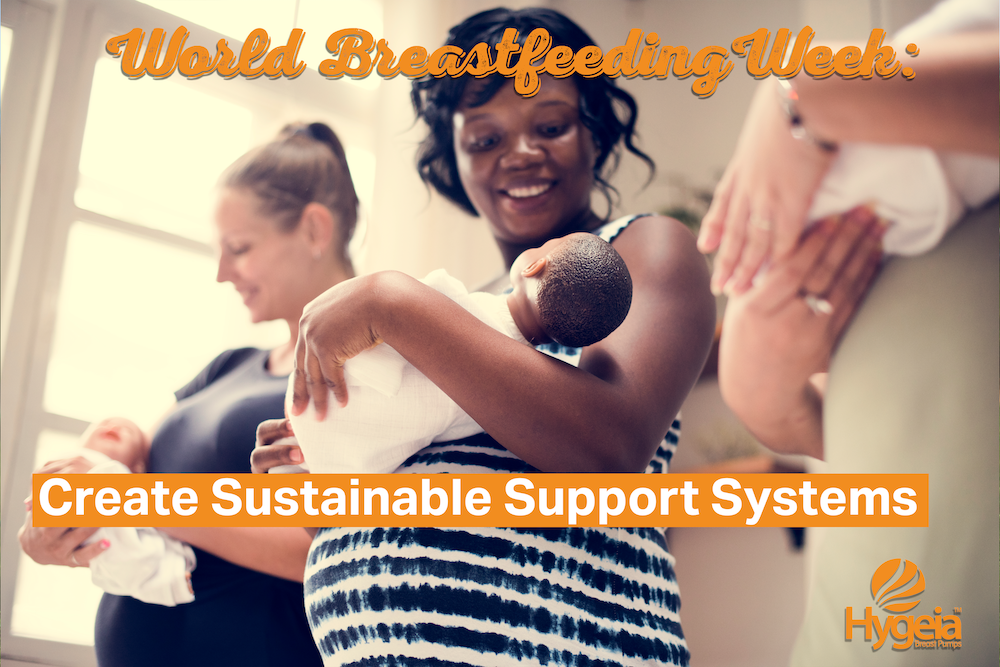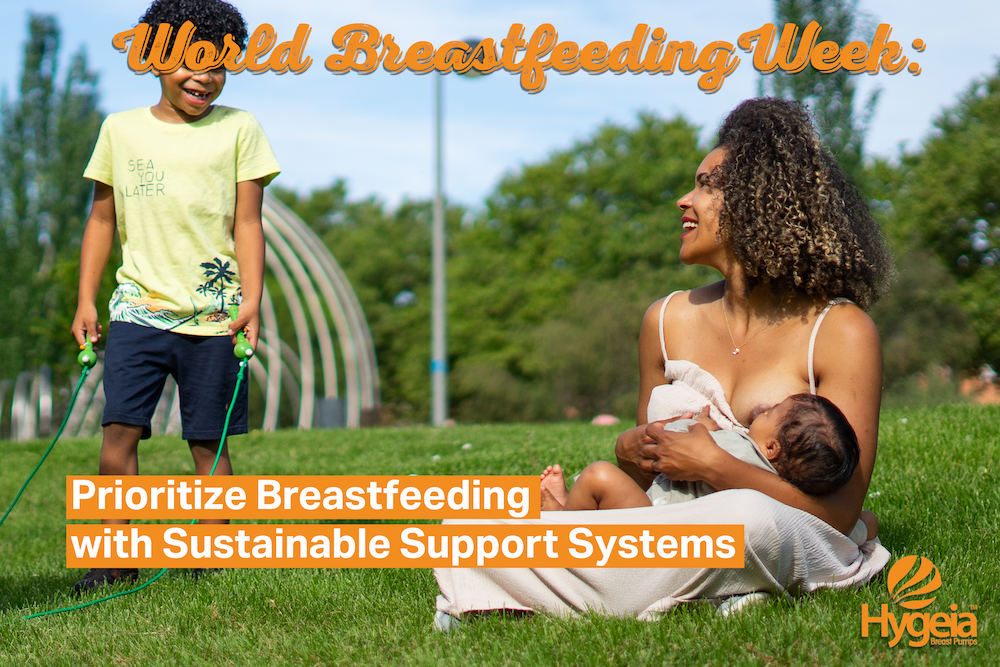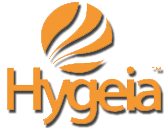
The most common word used to describe breastfeeding is “natural”. This act shared between mother and baby reflects the beauty found in the natural role of motherhood. “Natural” also reflects why breastfeeding needs prioritized in today’s world. Breastfeeding is a natural solution and therefore a sustainable one. World Breastfeeding Week 2025 inspires us to look beyond the immediate act of feeding and consider a much bigger picture. This blog post will dive into the this year’s theme: “Prioritize Breastfeeding: Create sustainable support systems.”
The Environmental Toll of Artificial Feeding
Hygeia is in full support of all mother’s and how they choose to feed their babies, be it breastfeeding or formula. Fed is best. No questions. This is truly the most important thing for every baby and that every mom knows what is best for her and her baby.
However, it is important to recognize that the environmental impact of artificial feeding is considerable. The entire process of formula production is energy-intensive and resource-heavy. From sourcing ingredients to manufacturing, packaging, and global distribution, it is a far cry from a “natural renewable food” like breast milk. One one hand, breast milk is environmentally safe and produced and delivered to the consumer without pollution, packaging, or waste. Artificial milk options demand significant amounts of electricity, fuel for transportation, and water for processing and cleaning. The waste generated, from non-recyclable containers to discarded formula, places a heavy burden on our planet’s ecosystems.
Building Sustainable Support Systems
Recognizing breastfeeding’s vital role in a sustainable future isn’t enough. We must create robust and sustainable support systems for families. There are numerous ways this can be done.
- Community Support: Grass roots is where all things begin. Fostering networks of lactation consultants, peer support groups, and family encouragement are necessary for normalizing breastfeeding. At Hygeia, we offer lactation support in partnership with Nest Collaborative. These virtual breastfeeding consults are accessible anytime, anywhere, and covered by most insurance plans.
- Workplace Policies: For breastfeeding to be normalized there must be support in the workplace. This will happen through advocacy for comprehensive paid maternity leave and flexible work arrangements. Additionally, moms need dedicated breastfeeding-friendly environments with clean, private lactation spaces.
- Healthcare System: The support and education must begin from day one for mothers. We must ensure that healthcare providers are well-trained in lactation support. Facilities must also adhere to best practices like the Baby-Friendly Hospital Initiative.
- Policy and Advocacy: Globally, we must endorse policies that protect, promote, and support breastfeeding. This includes strict adherence to the International Code of Marketing of Breast-milk Substitutes to counter misleading marketing.
- Changing the Narrative: All of these steps will play a part, but individuals must also work to normalize breastfeeding in all settings. Encourage a mom who is breastfeeding in public. Educate a friend on her public breastfeeding rights. Help dismantle any lingering stigma around breastfeeding.
Breastfeed
At Hygeia, we believe that empowering mothers is the first step toward a more sustainable future. By providing you with access to our high-quality breast pumps, we aim to make breastfeeding a comfortable and efficient experience. Every journey is unique, which is why we’re dedicated to helping you get your pump 100% covered by your insurance plan. We are removing financial barriers to this natural choice.
Supporting a mother is an act of environmental stewardship. By strengthening the systems around us—from our communities to our workplaces—we can make breastfeeding a realistic option for more families. It’s an investment in a healthier tomorrow, for our children and for our planet. Therefore, join us in championing this natural, sustainable solution during World Breastfeeding Week.

Imagine a single act that nourishes a baby, empowers a mother, and protects our planet. This World Breastfeeding Week 2025, we’re doing more than celebrating infant feeding; we’re championing a powerful solution for our planet’s future. From August 1st to 7th, the #WBW2025 campaign will shine a crucial spotlight on the profound connection between breastfeeding, environment, and climate change, urging all to “Prioritize Breastfeeding: Create Sustainable Support Systems.”
The world is in the trenches of era where environmental concerns dominate global conversations. Hygeia will always support mothers in finding the best solution for their personal situation and seeing to it that baby is fed and mother is healthy. However, at Hygeia, we also know it is vital to recognize breastfeeding as a key player in fostering a sustainable environment and actively reducing the impact of climate change caused by artificial feeding.
The Green Power of Breastfeeding
Breast milk is often called nature’s perfect food, but its environmental benefits are equally remarkable.
Reduced Carbon Footprint
Unlike infant formula, breastfeeding boasts a significantly lower carbon footprint. It requires no industrial manufacturing processes, factories, or energy-intensive machinery that release greenhouse gas emissions. Furthermore, breast milk is the ultimate local food; it requires no transportation, eliminating the emissions associated with shipping ingredients or finished products across vast distances.
Waste Reduction
Breastfeeding is a champion of waste reduction. It produces absolutely zero waste – no plastic bottles, no metal cans, no paper packaging to end up in landfills. Breastfeeding also significantly reduces water consumption. There’s no need for water to prepare formula or sterilize bottles, conserving this precious resource. While a breastfeeding mother needs to stay hydrated, this is a natural biological need, not an industrial demand.
Conservation of Resources
Breastfeeding lessens our reliance on industrial agriculture, particularly the dairy industry. Most formulas are cow’s milk-based, an industry known for its contribution to methane emissions from livestock, extensive land degradation for grazing, and massive water usage. By choosing breastfeeding, we indirectly support resource conservation and the protection of biodiversity, promoting more sustainable practices overall.
Championing the Natural Solution
This World Breastfeeding Week 2025, let’s come together to champion this incredible, natural solution. At Hygeia Health, we are dedicated to empowering mothers through high-quality breast pumps and comprehensive support. Our products are designed to make breastfeeding more comfortable and efficient, while our resources provide valuable information and guidance.
By prioritizing breastfeeding and building strong, lasting support systems, we’re not just investing in the health and well-being of our children; we’re taking meaningful climate action and fostering a truly sustainable environment for future generations. Every ounce of breast milk is a drop in the ocean of positive change.

World Breastfeeding Week is here, running from August 1-7, and this year’s theme, “Closing the Gap, Support for All,” underscores the critical need to improve breastfeeding support and reduce inequalities.
At Hygeia, we know that breastfeeding is a cornerstone of child health and nutrition, yet countless mothers face challenges that hinder their breastfeeding journey. Throughout the upcoming week, we take a deep dive into the current state of breastfeeding awareness and the challenges that many mothers face as well as resources for overcoming those challenges. We will also provide some best practices for successful breastfeeding.
The Breastfeeding Gap
The proven benefits of exclusive breastfeeding are endless. The perfectly balanced nutrition source provides essential antibodies and nutrients that protect infants from a range of illnesses and can reduce infant mortality by up to 13%. The World Health Organization estimates that breastfeeding could save the lives of over 820,000 children under five years of age annually.
Unfortunately, breastfeeding rates vary significantly across the globe, with disparities evident among socioeconomic groups, ethnicities, and geographic locations. These disparities highlight the urgent need for targeted support to ensure all mothers have the resources and encouragement they need to breastfeed successfully, thus the theme of “Closing the Gap” for this year’s World Breastfeeding Week.
The Breastfeeding Challenge
New mothers often encounter significant hurdles in establishing and maintaining successful breastfeeding. Physical challenges such as sore nipples, insufficient milk supply, or baby latching difficulties can be overwhelming especially with many moms feeling a lack of support during that critical first week.
Societal pressures, including a lack of workplace support, inadequate maternity leave, and cultural norms that prioritize formula feeding, can also discourage breastfeeding and, again, create a lack of support even for those mothers who desire to breastfeed. Additionally, misinformation and limited access to lactation support can contribute to breastfeeding cessation.
Collectively, these situations and factors create a complex environment that makes it difficult for many women to achieve their breastfeeding goals.
Overcoming The Challenges
The good news? Many organizations and even individuals–moms like you–are dedicated to making breastfeeding less of a challenge for moms globally, thus the initiative of World Breastfeeding Week. This movement is initiated by the World Alliance for Breastfeeding Action (WABA), which is dedicated to the protection, promotion and support of breastfeeding worldwide. To address the challenges of breastfeeding, comprehensive support systems must be in place: education, counseling, and practical assistance.
Hygeia is excited to have more resources than ever available to support mothers with the launch of our new website. Not only does our parent blog offer new education on a weekly basis, but we also partner with Nest Collaborative to provide virtual breastfeeding consults accessible anytime, anywhere, covered by most insurance plans at no cost to you.
Breastfeeding Best Practices
Along with specialized support, knowing and understanding the best practices of breastfeeding can heavily impact a mom’s success and decision to stick with breastfeeding and reach her goals. Early initiation by breastfeeding within the first hour of baby’s life is the first step every mom should aim to achieve while also taking advantage of any on-staff lactation consultants at the hospital.
Moms should strive to breastfeed for the first six months with breast milk as the sole source of nutrition. Beyond that, babies will highly benefit from the breast milk nutrition for the next two years, but should also be introduced to complementary foods after six months of age. It is also imperative to build a strong support system as a breastfeeding mother. This includes family, friends, healthcare providers, and lactation consultants.
Commitment to Supporting Mothers
At Hygeia Health, we are dedicated to empowering mothers through high-quality breast pumps and comprehensive support. Our products are designed to make breastfeeding more comfortable and efficient, while our resources provide valuable information and guidance.
World Breastfeeding Week is an opportunity to raise awareness about the importance of breastfeeding and to advocate for policies that support breastfeeding mothers. Let’s work together to close the breastfeeding gap and ensure that every mother has the support she needs to nourish her baby through breastfeeding.



